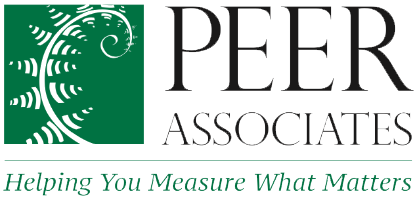10th Anniversary Self-Study
In 2013, as part of acknowledging our first decade as a business, the PEER Associates team undertook a systematic self-study, conducting interviews with a purposeful sample of thirty-one past and current clients. This process — dubbed Client Outreach for Organizational Learning (COOL) — gave PEER an opportunity to turn the utilization-focused evaluation process back on ourselves. Specifically, we investigated how we might use PEER’s ten year milestone to prompt internal reflection and business development.
We learned a lot! Here are a few highlights:
Clients claimed that PEER’s process generated as much or more value than the products in terms of lasting utility of evaluations to their organizations. Interviewees referred to PEER as participatory, responsive, collaborative, communicative, adaptable, approachable, flexible, customized, non-commercial, pragmatic and practical, honest and direct, and trustworthy. Clients appreciated “feeling listened to,” having PEER staff to “bounce ideas off of,” being part of a “productive team” with PEER, and feeling comfortable talking freely with PEER about difficult issues.
Clients shared many specific suggestions for improvement that PEER has since attended to. Specific examples include: increasing our specificity in coaching clients in using evaluation findings after the evaluation period, and encouraging clients to set up monthly check in calls with PEER in order to prioritize ongoing, reliable communications and extract the most value from the process.
We received confirmation that PEER’s integrated services model --an effort to more explicitly weave together evaluation, strategy, and program design in our work with clients--resonated strongly for our clients.
Nearly every client interviewed felt that PEER had gone beyond the traditional evaluator role of conducting evaluations for organizations to also building their internal evaluation capacity. Interviewees identified two types of capacity building that they benefitted from: building capacity technically by offering them new processes or tools to put into use on their own with the project at hand or with other projects; and building capacity professionally by modeling and offering new ways of thinking which shift organizational culture more subtly.
“Working with PEER not only brought true professionalism to the initiative, but helped us in crafting the program itself.”


